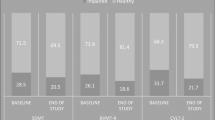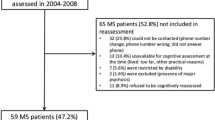Abstract
Background
Cognitive impairment (CI) is a frequent symptom of multiple sclerosis (MS) and has a great impact on the patients’ quality of life, so screening is essential. The brief international cognitive assessment for multiple sclerosis (BICAMS) was developed for this purpose. However, longitudinal data is lacking with the use of the battery.
Objective
This study is to assess the performance of patients after 5 and 7 years of the original BICAMS validation study and to identify any influencing factors.
Methods
BICAMS was used to measure cognitive function of 52 relapsing-remitting MS patients (RRMS) from the original validation study after 5 years (n = 43) and again, after 7 years (n = 42). Patients filled out the fatigue impact scale (FIS) and multiple sclerosis quality of life-54 (MSQoL-54) questionnaire, and we evaluated expanded disability status scale (EDSS).
Results
There was an improvement in the BVMT-R and the CVLT-II assessments at both the 5-year (p<0.001 and p=0.025) and the 7-year retest (p<0.001 and p=0.002). The prevalence of CI significantly decreased at the 5-year mark (p=0.021) but remained stable after that. There was no deterioration in MSQoL scores during the study. The basic cognitive performance is the most important influencing factor, but the duration of the disease, the EDSS score, and the escalation of the therapy also affect the cognitive scores.
Conclusion
This is the longest longitudinal study utilizing the BICAMS battery, reinforcing its feasibility as a clinical screening tool. It seems that cognitive performance may improve in the long term and early initiation of effective therapy may influence this outcome.

Similar content being viewed by others
References
Ruano L, Portaccio E, Goretti B, Niccolai C, Severo M et al (2017) Age and disability drive cognitive impairment in multiple sclerosis across disease subtypes. Mult Scler 23:1258–1267
Smestad C, Sandvik L, Landro NI, Celius EG (2010) Cognitive impairment after three decades of multiple sclerosis. Eur J Neurol 17:499–505
Amato MP, Zipoli V, Portaccio E (2006) Multiple sclerosis-related cognitive changes: a review of cross-sectional and longitudinal studies. J Neurol Sci 245:41–46
Glanz BI, Holland CM, Gauthier SA, Amunwa EL, Liptak Z et al (2007) Cognitive dysfunction in patients with clinically isolated syndromes or newly diagnosed multiple sclerosis. Mult Scler 13:1004–1010
Biernacki T, Sandi D, Kincses ZT, Fuvesi J, Rozsa C et al (2019) Contributing factors to health-related quality of life in multiple sclerosis. Brain Behav 9:e01466
Benedict RH, Wahlig E, Bakshi R, Fishman I, Munschauer F et al (2005) Predicting quality of life in multiple sclerosis: accounting for physical disability, fatigue, cognition, mood disorder, personality, and behavior change. J Neurol Sci 231:29–34
Langdon DW, Amato MP, Boringa J, Brochet B, Foley F et al (2012) Recommendations for a brief international cognitive assessment for multiple sclerosis (BICAMS). Mult Scler 18:891–898
Sartori E, Edan G (2006) Assessment of cognitive dysfunction in multiple sclerosis. J Neurol Sci 245:169–175
Kalb R, Beier M, Benedict RH, Charvet L, Costello K et al (2018) Recommendations for cognitive screening and management in multiple sclerosis care. Mult Scler 24:1665–1680
Soelberg Sorensen P, Giovannoni G, Montalban X, Thalheim C, Zaratin P et al (2019) The multiple sclerosis care unit. Mult Scler 25:627–636
Potticary H, Langdon D (2023) A systematic review and meta-analysis of the brief cognitive assessment for multiple sclerosis (BICAMS) international validations. J Clin Med 12(2):703
Sandi D, Rudisch T, Fuvesi J, Fricska-Nagy Z, Huszka H et al (2015) The Hungarian validation of the Brief international cognitive assessment for multiple sclerosis (BICAMS) battery and the correlation of cognitive impairment with fatigue and quality of life. Mult Scler Relat Disord 4:499–504
Dusankova JB, Kalincik T, Havrdova E, Benedict RH (2012) Cross cultural validation of the Minimal assessment of cognitive function in multiple sclerosis (MACFIMS) and the Brief international cognitive assessment for multiple sclerosis (BICAMS). Clin Neuropsychol 26:1186–1200
Polman CH, Reingold SC, Banwell B, Clanet M, Cohen JA et al (2011) Diagnostic criteria for multiple sclerosis: 2010 revisions to the McDonald criteria. Ann Neurol 69:292–302
Bencsik K, Sandi D, Biernacki T, Kincses Z, Fuvesi J et al (2017) The multiple sclerosis registry of szeged. Ideggyogy Sz 70:301–306
Smith A (1973) Symbol digit modalities test. western psychological services, Los Angeles
Benedict RH (1997) Brief visuospatial memory test--revised. PAR
Delis DC (2000) California verbal learning test. Adult version Manual Psychological Corporation
Krupp LB, Alvarez LA, LaRocca NG, Scheinberg LC (1988) Fatigue in multiple sclerosis. Arch Neurol 45:435–437
Bol Y, Duits AA, Hupperts RM, Verlinden I, Verhey FR (2010) The impact of fatigue on cognitive functioning in patients with multiple sclerosis. Clin Rehabil 24:854–862
Bailey A, Channon S, Beaumont JG (2007) The relationship between subjective fatigue and cognitive fatigue in advanced multiple sclerosis. Mult Scler 13:73–80
Losonczi E, Bencsik K, Rajda C, Lencses G, Torok M et al (2011) Validation of the fatigue impact scale in Hungarian patients with multiple sclerosis. Qual Life Res 20:301–306
Fuvesi J, Bencsik K, Benedek K, Matyas K, Meszaros E et al (2008) Cross-cultural adaptation and validation of the ‘Multiple Sclerosis Quality of Life Instrument’ in Hungarian. Mult Scler 14:391–398
Wold S, Sjostrom M, Eriksson L (2001) PLS-regression: a basic tool of chemometrics. Chemometr Intell Lab Syst 58:109–130
Bourgeois DL, Kreeger PK (2017) Partial least squares regression models for the analysis of kinase signaling. methods. Mol Biol 1636:523–533
Wold S, Johansson E, Cocchi M (1993) PLS: partial least squares projections to latent structures. In: 3D QSAR in Drug Design: Theory, Methods and Applications. Kluwer ESCOM Science Publisher, pp 523–550
Skorve E, Lundervold AJ, Torkildsen O, Myhr KM (2020) A two-year longitudinal follow-up of cognitive performance assessed by BICAMS in newly diagnosed patients with MS. Mult Scler Relat Disord 46:102577
Gaughan M, Monaghan R, O'Connell K, McNicholas N, Yap SM et al (2021) Five-year follow up of the original Irish BICAMS validation cohort. Mult Scler Relat Disord 56:103257
Jonsson A, Andresen J, Storr L, Tscherning T, Soelberg Sorensen P et al (2006) Cognitive impairment in newly diagnosed multiple sclerosis patients: a 4-year follow-up study. J Neurol Sci 245:77–85
Hauser SL, Bar-Or A, Cohen JA, Comi G, Correale J et al (2020) Ofatumumab versus Teriflunomide in multiple sclerosis. N Engl J Med 383:546–557
Dardiotis E, Perpati G, Borsos M, Nikolaidis I, Tzanetakos D et al (2022) Real-world assessment of quality of life in patients with relapsing remitting multiple sclerosis treated with teriflunomide for two years: patient-reported outcomes from the AURELIO study in Greece. Neurol Ther 11:1375–1390
Bencsik K, Dobos E, Jobbagy Z, Birkas AJ, Kovacs K et al (2022) Real-world evidence for favourable quality-of-life outcomes in hungarian patients with relapsing-remitting multiple sclerosis treated for two years with oral teriflunomide: results of the Teri-REAL study. Pharmaceuticals (Basel) 15(5):598
Ferrer E, Salthouse TA, Stewart WF, Schwartz BS (2004) Modeling age and retest processes in longitudinal studies of cognitive abilities. Psychol Aging 19:243–259
Scharfen J, Jansen K, Holling H (2018) Retest effects in working memory capacity tests: a meta-analysis. Psychon Bull Rev 25:2175–2199
Pitteri M, Romualdi C, Magliozzi R, Monaco S, Calabrese M (2017) Cognitive impairment predicts disability progression and cortical thinning in MS: An 8-year study. Mult Scler 23:848–854
Deloire M, Ruet A, Hamel D, Bonnet M, Brochet B (2010) Early cognitive impairment in multiple sclerosis predicts disability outcome several years later. Mult Scler 16:581–587
Moccia M, Lanzillo R, Palladino R, Chang KC, Costabile T et al (2016) Cognitive impairment at diagnosis predicts 10-year multiple sclerosis progression. Mult Scler 22:659–667
Damasceno A, Pimentel-Silva LR, Damasceno BP, Cendes F (2020) Cognitive trajectories in relapsing-remitting multiple sclerosis: a longitudinal 6-year study. Mult Scler 26:1740–1751
Patti F, Nicoletti A, Messina S, Bruno E, Fermo SL et al (2015) Prevalence and incidence of cognitive impairment in multiple sclerosis: a population-based survey in Catania, Sicily. J Neurol 262:923–930
Sandi D, Biernacki T, Szekeres D, Fuvesi J, Kincses ZT et al (2017) Prevalence of cognitive impairment among Hungarian patients with relapsing-remitting multiple sclerosis and clinically isolated syndrome. Mult Scler Relat Disord 17:57–62
Sacca F, Costabile T, Carotenuto A, Lanzillo R, Moccia M et al (2017) The EDSS integration with the Brief International Cognitive Assessment for Multiple Sclerosis and orientation tests. Mult Scler 23:1289–1296
Pinter D, Sumowski J, DeLuca J, Fazekas F, Pichler A et al (2014) Higher education moderates the effect of T2 lesion load and third ventricle width on cognition in multiple sclerosis. PLoS One 9:e87567
Sandi D, Fricska-Nagy Z, Bencsik K, Vecsei L (2021) Neurodegeneration in multiple sclerosis: symptoms of silent progression, biomarkers and neuroprotective therapy-kynurenines are important players. Molecules 26(11):3423
Golan D, Doniger GM, Wissemann K, Zarif M, Bumstead B et al (2018) The impact of subjective cognitive fatigue and depression on cognitive function in patients with multiple sclerosis. Mult Scler 24:196–204
Hanken K, Eling P, Hildebrandt H (2015) Is there a cognitive signature for MS-related fatigue? Mult Scler 21:376–381
Jongen PJ (2017) Health-related quality of life in patients with multiple sclerosis: impact of disease-modifying drugs. CNS Drugs 31:585–602
Acknowledgements
We would like to thank our MS nurses (Judit Erdélyi, Alexandra Csizmadia), and administrators (Ibolya Kéri Fürediné, Violetta Molnár) for their constant precise work, without which this assessment could not have taken place.
Author information
Authors and Affiliations
Contributions
Conceptualization: Dániel Sandi and Krisztina Bencsik. Data collection and analysis was performed by all authors. The first draft of the manuscript was written by Aliz Nyári and Dániel Sandi. All authors commented on previous versions of the manuscript. All authors read and approved the final manuscript.
Corresponding author
Ethics declarations
Conflict of interest
The authors declare no competing interests.
Ethical approval
This study was performed in line with the principles of the Declaration of Helsinki. Approval was granted by the Ethics Committee of the University of Szeged (Approval numbers: 207/2015 SZTE RKEB and 124/2013-SZTE RKEB). Participation in the study was based on written informed consent.
Additional information
Publisher’s note
Springer Nature remains neutral with regard to jurisdictional claims in published maps and institutional affiliations.
Rights and permissions
Springer Nature or its licensor (e.g. a society or other partner) holds exclusive rights to this article under a publishing agreement with the author(s) or other rightsholder(s); author self-archiving of the accepted manuscript version of this article is solely governed by the terms of such publishing agreement and applicable law.
About this article
Cite this article
Nyári, A., Kokas, Z., Szamosi, S. et al. The 7-year follow-up of the Hungarian BICAMS validation cohort implies that cognitive performance may improve in multiple sclerosis patients. Neurol Sci 45, 3369–3378 (2024). https://doi.org/10.1007/s10072-024-07347-5
Received:
Accepted:
Published:
Issue Date:
DOI: https://doi.org/10.1007/s10072-024-07347-5




